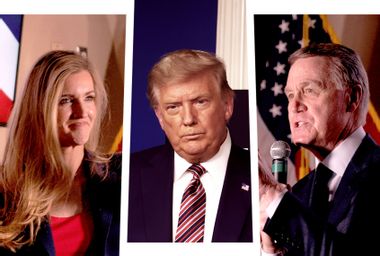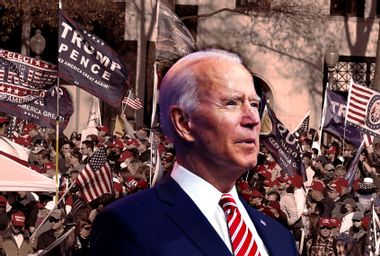More than eighty years ago, a then-obscure German philosopher wrote an essay that foresaw the essential reason behind President Donald Trump's enduring political appeal. His name was Walter Benjamin; born to a Jewish family in Berlin, Benjamin was present for a pivotal moment in history, and watched Hitler rise to power. By the time he wrote his most famous essay, he was an exile living in France amidst financial hardships, having recognized that the Reichstag fire three years earlier signified that the Nazis had achieved total power in Germany.
In 1936 — as Hitler was violating international treaties with impunity and preparing Germany for war (a threat that many Western powers did not take seriously) — Benjamin, a Marxist and a Jew who was thus obviously opposed to the Nazis, postulated that modern fascists succeed when they are entertainers. Not just any entertainer — a circus clown or a juggler-turned-fascist wouldn't do. Specifically, modern fascists were entertainers with a distinct aesthetic, one that appeals to mass grievances by encouraging their supporters to feel like they are personally expressing themselves through their demagogue of choice.
Benjamin's insight, which appears to have been largely forgotten, is that keeping fascism out of power means recognizing how they use aesthetic entertainment to create their movements. That does require us to admit, cringe-inducing though it may be, that Trump is an artist — albeit a tacky, shallow and transparently self-aggrandizing one. More importantly, his movement, the MAGA crowd, has a distinct aesthetic which he has created and honed for them.
The key passage from Benjamin's "The Work of Art in the Age of Mechanical Reproduction," which was published in 1936, deserves to be quoted in full:
Fascism attempts to organize the newly created proletarian masses without affecting the property structure which the masses strive to eliminate. Fascism sees its salvation in giving these masses not their right, but instead a chance to express themselves. The masses have a right to change property relations; Fascism seeks to give them an expression while preserving property. The logical result of Fascism is the introduction of aesthetics into political life.
Earlier in the essay, Benjamin describes how the history of art itself had changed in modern history. Although works of art were initially created carefully by individual craftsmen working under mentors, industrialization made it possible for art to be produced on a large scale and distributed quickly and easily among millions of people. (Bear in mind that he wrote this in 1936, when printing presses and radio were the main means of mass distribution, television was in its infancy and the internet had yet to be conceived.)
Not surprisingly, this meant that politicians had learned how to utilize art to advance their own agendas. Fascists, however, took things one step further: They recognized that, by using purely aesthetic entertainment to create solidarity among their supporters, they could distract them from the economic and social forces oppressing them, and instead build political movements based around the ability to creatively express their grievances. In other words, you could promote policies that rampantly redistributed wealth upwards, consolidated power in the hands of a few and dismantled democracies, and one's followers would not care as long as they had the aesthetic entertainment to comfort them and make them believe they were being heard by those very politicians who fundamentally despised them.
Because Benjamin was most concerned with Adolf Hitler, who ruled Germany from 1933 to 1945, his essay drew particular attention to Hitler's love of extravagant military exhibitions. Clearly, there are parallels to Trump, who has used gaudy military pageantry in unprecedented ways to impress his supporters, as well as declared literal war on many of his own citizens, in part to achieve that same effect. Benjamin quotes Italian fascist and futurist Filippo Tommaso Marinetti, whose celebration of war is chillingly poetic:
War is beautiful because it establishes man's dominion over the subjugated machinery by means of gas masks, terrifying megaphones, flame throwers, and small tanks. War is beautiful because it initiates the dreamt-of metalization of the human body. War is beautiful because it enriches a flowering meadow with the fiery orchids of machine guns. War is beautiful because it combines the gunfire, the cannonades, the cease-fire, the scents, and the stench of putrefaction into a symphony.
Obviously, Trump's understanding of art and entertainment precedes his military displays, and may explain how he became the first president to lack either political or military experience. Acknowledging that he did not actually write the books like "The Art of the Deal," which helped make him famous, he still played a major role in choosing the faux-opulent and brassy architectural style that distinguished his early buildings. He was a major creative force behind his hit reality TV show "The Apprentice," which he hosted for a decade until shortly before he began his 2016 presidential campaign. While it would be a stretch to describe Trump as having the soul of an artist, he has always intuitively understood that people like to be entertained, and that making a spectacle of your businesses (such as his real estate holdings) and of oneself (such as through his reality TV show) is good for business.
By developing a knack for entertaining the masses in a self-promotional way — whether by claiming credit for art he did nothing to produce, like "The Art of the Deal," or actually playing a role in artistic choices over investments like his buildings and his TV show — Trump created an image for himself as the quintessential American businessman, the type of billionaire that, as comedianJohn Mulaney astutely observed in 2009, is a caricature of what a hobo might imagine a wealthy person to be like. For the first sixty-plus years of his life, Trump became adept at using aesthetic presentations to make himself into a pop culture icon.
When he decided to run for president, he simply transferred that understanding to the political realm.
There are two main ways that he did this prior to his presidency, both of which he has continued to do during his administration. The first is through his tweets, which took advantage of Americans' dwindling attention span by regularly packing memorable, punchy ideas into very small packages. As Amanda Hess wrote in Slate back in 2016, the secret to Trump's ability to create a political movement off of Twitter is that "whether he realizes it or not—and he's tweeted that he has 'a very high IQ,' so I'm assuming he does—his most Trump-ian tweets manage to hit upon all three of Aristotle's modes of persuasion: logos (the appeal to logic), ethos (the appeal to credibility), and pathos (the appeal to emotion)."
Trump has tweeted so much that it would take an entire academic paper to deconstruct all of them thoroughly, but Hess' analysis of a Trump tweet directed at one of his rivals in the 2016 Republican primaries, former Florida Gov. Jeb Bush, is quite revealing. After quoting Trump's tweet — "Jeb Bush never uses his last name on advertising, signage, materials etc. Is he ashamed of the name BUSH? A pretty sad situation. Go Jeb!" — Hess points out that "he seized on a truth about Jeb Bush's campaign branding, leveraged it to question the very legitimacy of the Bush name, declared the situation 'sad,' and still had leftover space to offer some condescending words of encouragement."
One finds the same strategy in his tweets trying to delegitimize Joe Biden's victory in the 2020 election, which the president insists he won even though he has repeatedly failed in court to prove any of his claims. On Thursday he nevertheless tweeted, "The 'Republican' Governor of Georgia, [Brian Kemp], and the Secretary of State, MUST immediately allow a signature verification match on the Presidential Election. If that happens, we quickly and easily win the State and importantly, pave the way for a big David and Kelly WIN!" Again, Trump very strategically packed a lot into this single tweet: An insult against a fellow Republican who he feels has been disloyal by not helping him steal the election, to inspire anger; a seeming appeal to logic by requesting "a signature verification match"; and the offer of rewards for other powerful if his wishes are granted.
But the other aesthetic that Trump has honed impeccably is the art of trolling. As my colleague Amanda Marcotte wrote in her book "Troll Nation: How The Right Became Trump-Worshipping Monsters Set On Rat-F*cking Liberals, America, and Truth Itself," this fit with a longstanding trend among American conservatives. Indeed, for years before Trump's rise, they began transitioning away from advocating for traditional conservative ideas and instead focused on encouraging their followers to be bitter, hateful and paranoid. Over time, American right-wing politics was no longer defined by beliefs, but by intense hostility toward perceived threats that they invariably attributed to the left.
"Watch Fox News any day of the week, and most of what they cover is a bunch of segments about how liberals are hypocrites or liberals are the worst,"Marcotte told Salon in 2018 when discussing her book. "Everything is just reinforcing the stereotype of liberals as these hate objects you can just feel justified in trying to punish." She later added that "conservative audiences respond to this kind of media because they want to. I think we underestimate how much people are going to do what they want to do and believe what they want to believe." While Trump supporters may recognize that certain government programs help them, they will disregard those facts if a right-winger appeals to their hostility toward racial minorities, women, the LGBTQ community, immigrants or members of other marginalized groups.
This trolling approach defines Trump's official speeches, his press conferences, the rhetoric he employs at political rallies and virtually every other aspect of his political life. For his followers, this type of communication trope has become ingrained into their being. Plenty of conservative politicians appealed to their supporters' basest instincts prior to Trump, but the president and his followers made overtly vilifying the left and gleefully savoring upsetting leftists through their words and actions into their central appeal. He did this when he kicked off his aborted 2012 presidential campaign by promoting a racist conspiracy theory about President Barack Obama and his successful 2016 effort by disparaging Mexican immigrants as rapists and criminals. He has done this on the countless occasions when he has made inflammatory statements about important issues that inevitably upset the left and, just as inevitably, put Trump in the headlines. He and his supporters have even sold T-shirts with controversial messages by appealing to supporters' desire to "drive liberals crazy." Frequently, Trump supporters will actually admit that they don't agree with his rhetoric, but they enjoy his sadistic bullying because it makes them feel good. In other words, they connect with the aesthetic.
Trump's is an an approach that goes beyond mere rhetoric and enters the realm of performance art, a fact that Trump himself unintentionally acknowledged during his first speech at the 2020 Republican National Convention, when he urged his supporters to chant "12 more years" in order to "really drive [liberals] crazy." That moment epitomized precisely how Trump has transformed traditional political rhetoric into performance art: Instead of simply making the case for his candidacy or advocating for certain ideas, Trump focused on creating a moment in which he would entreat his followers to join him in a performance — not for a major political point, but simply to elicit a desired emotional response from their supposed common enemy. It was the type of performance art that Trump has perfected: To act like a troll, and encourage his supporters to act like trolls, and thereby create an act of mass catharsis through creative self-expression that did absolutely nothing to address any legitimate economic or social concerns that his supporters might have.
If Trump was simply using these ends to advance an otherwise traditional political career, it would debase democracy but not necessarily pose a threat to it. The problem is that Trump is not a traditional American politician; he has all the hallmarks of being a fascist. As Italian philosopher Umberto Eco wrote in a 1995 essay about fascism, "behind a regime and its ideology there is always a way of thinking and feeling, a group of cultural habits, of obscure instincts and unfathomable drives." There are many drives that fuel fascist movements and are present with Trump, including a glorification of an imagined past through appeals to traditionalism (hence Trump's slogan to "Make America Great Again"), a hostility toward intellectuals and a fear of difference (to quote Eco, "the first appeal of a fascist or prematurely fascist movement is an appeal against the intruders" and is thus "racist by definition"). Fascist movements also pander to the individual and social frustrations of their followers, heavily rely onnationalism, convince themselves that their opponents are elitists and utilize a specific type of machismo that "implies both disdain for women and intolerance and condemnation of nonstandard sexual habits, from chastity to homosexuality." When fascists talk about their support of "the People," it is not in terms of a belief in individual rights but rather as "a monolithic entity expressing the Common Will. Since no large quantity of human beings can have a common will, the Leader pretends to be their interpreter. Having lost their power of delegation, citizens do not act; they are only called on to play the role of the People."
Even if Trump never again holds political office, the fascist tendencies that he exploited will continue to thrive, and it is not inconceivable that a future fascist political aspirant will figure out how to replicate his ability to create a political aesthetic as the glue that holds their movement together. The ongoing debacle over Trump's refusal to accept his 2020 election loss is a perfect example of that. For Trump himself, this is almost certainly a symptom of his obvious narcissism, the fact that in his world nothing is worse than being a "loser." Yet it is telling that so many people are buying into his claims (a recent poll found that 73 percent of likely Republican voters and 44 percent of all likely voters are questioning Biden's victory), despite there being no evidence of voter fraudwhatsoever.
Even if Trump miraculously vanishes from the political scene after leaving office, his lies about the 2020 election are likely to foreshadow future ways in which American fascists use mass entertainment to win over support. As Marcotte recently noted, polls show that most Republican voters do believe that their votes counted, and there are no plausible signs of waning interest in participating in future elections, because they realize that Trump's claims of being robbed are yet another performance art piece in which they can participate.
"Republican voters understand perfectly that Trump's lies are part of a con game — and they imagine they're in on the con," Marcotte wrote. Replace "con" with "spectacular show," or "mass entertainment," or even (dare I say it) "work of art." That's the Trump aesthetic.
The reality is that the problems facing ordinary Americans economically, socially, ecologically and internationally are largely due to the forces identified by the left: income inequality, lack of access to basic needs like healthcare, student debt, predatory lending and so on are all side effects of capitalism. Yet as long as fascists know how to win over supporters by appealing to an aesthetic — whether military parades and catchy tweets or trolling public statements and conspiracy theories that exist mainly to create a shared false narrative that can upset and delegitimize the left — their followers will misidentify the source of their misery, as Benjamin foresaw.
MATTHEW ROZSA
Matthew Rozsa is a staff writer for Salon. He holds an MA in History from Rutgers University-Newark and is ABD in his PhD program in History at Lehigh University. His work has appeared in Mic, Quartz and MSNBC.
MORE FROM MATTHEW ROZSA



No comments:
Post a Comment